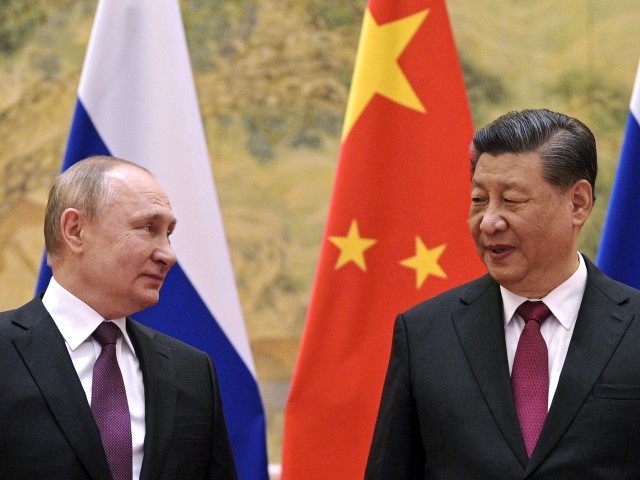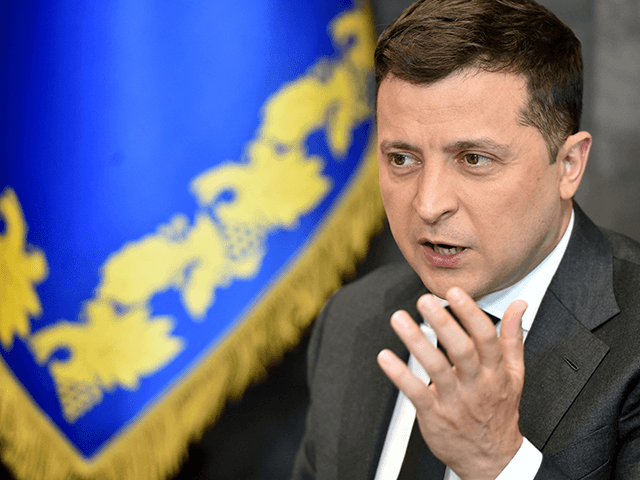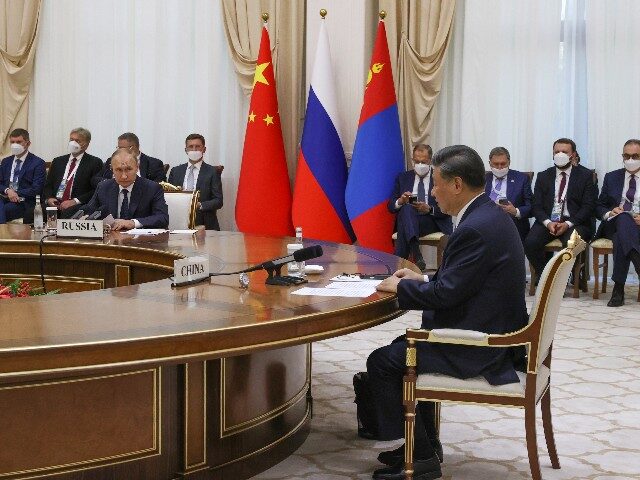Russian leader Vladimir Putin met with Chinese dictator Xi Jinping on Thursday, their first in-person meeting since the Beijing Winter Olympics, telling one of his closest allies that he appreciated Beijing’s “balanced” position on his invasion of Ukraine and understood its “concerns.”
Putin’s reference to Chinese “concerns” on the issue – in contrast with Russia’s full-throated support for illegal Chinese claims over the nation of Taiwan – served to highlight the Chinese Communist Party’s refusal to entirely embrace the reasoning that Putin has used to justify escalating an eight-year attempt to colonize Ukraine this February. At the time, Putin insisted that Ukraine had “no tradition” of being a sovereign state and was “completely created by Russia,” so Russia had a responsibility to “de-Nazify” the country, presumably by ousting the administration of democratically elected President Volodymyr Zelensky. Zelensky has vehemently rejected accusations of Nazism, noting in particular that he is Jewish.
China maintains diplomatic ties with Ukraine. Ukraine is a member of China’s Belt and Road Initiative (BRI), a global debt trap scheme that offers predatory loans to poor countries to erode their sovereignty. Zelensky has repeatedly stated that he aspires for more Chinese cooperation in both ending the war and reconstructing regions of his country devastated by the invasion.
Xi and Putin met on the sidelines of the Shanghai Cooperation Organization (SCO) summit currently underway in Samarkand, Uzbekistan. The trip to Uzbekistan, including a stop in Kazakhstan Tuesday, is the first time Xi has left China since the Chinese coronavirus pandemic began there in late 2019.
The SCO is an Asian organization led by China with vague security, economic, and political goals. Chinese officials and state media insist that it is not a military alliance or a trade bloc and was not created to shore up opposition to Western free societies, leaving unspecified what its summits are intended to do.
The Kremlin published a Russian-language transcript of remarks to the press by both Putin and Xi prior to their meeting on Thursday. Putin, the transcript reveals, used the opportunity to promote what he called a “multipolar world” without American leadership and denounced “some rules that someone has come up with and is trying to impose on others, without even explaining what it is” – an apparent reference to human rights sanctions.
“We highly appreciate the balanced position of our Chinese friends in connection with the Ukrainian crisis,” Putin said, according to the Kremlin. “We understand your questions and concerns in this regard. During today’s meeting, of course, we will explain in detail our position on this issue, although we have spoken about this before.”
Putin concluded by reiterating the “One China principle,” which falsely claims that Taiwan is not a country, but a province of China. The nation of Taiwan operates an independent, sovereign government and has never in its history been ruled by any government based in Beijing.
The Kremlin transcript noted that Xi offered friendly remarks to his Russian counterpart but did not mention any issues by name,
“In the face of the colossal changes of our time on a global scale, unprecedented in the history of our time, we are ready, together with our Russian colleagues, to set an example as responsible world powers,” Xi was quoted as saying, “and play a leading role in bringing such a rapidly changing world onto a trajectory of sustainable and positive development.”
The Chinese Foreign Ministry, rather than publishing its own transcript, posted a readout of the meeting that notably omitted any discussion of Ukraine.
Putin, according to Beijing, celebrated the bilateral ties and asserted that China and Russia, the world’s most powerful rogue states, “have maintained close coordination on the international stage to uphold basic norms of international relations.”
“In the face of changes of the world, of our times and of history, China will work with Russia to fulfill their responsibilities as major countries and play a leading role in injecting stability and positive energy into a world of change and disorder,” Putin vowed, according to the Chinese Foreign Ministry.
Beijing relayed that Xi, during the leaders’ private discussion, “emphasized that China will work with Russia to extend strong mutual support on issues concerning each other’s core interests” but did not mention Ukraine. The Ukraine war is arguably Russia’s most important “core issue” at the moment, however, leaving the comment as open to interpretation as support for Moscow’s invasion.
Like the Kremlin, the Chinese Foreign Ministry relayed that Putin “is firmly committed to the one-China principle and condemns the provocative moves by individual countries [presumably, the United States] on issues concerning China’s core interests.”

Chinese President Xi Jinping, right, and Russian President Vladimir Putin talk to each other during their meeting in Beijing, China, Friday, Feb. 4, 2022. Russian President Vladimir Putin is in Beijing for the Winter Olympics and talks with his Chinese counterpart Xi Jinping, amid soaring tensions with Ukraine (Alexei Druzhinin, Sputnik, Kremlin Pool Photo via AP).
The emphasis on the part of the Foreign Ministry on the Taiwan issue while disregarding Russia’s claims to territory in Ukraine is notable because Chinese officials have loudly rejected comparisons between the two issues, often made by those concerned that China will soon invade Taiwan in a similar manner.
“Taiwan is for sure not Ukraine,” Chinese Foreign Ministry spokeswoman Hua Chunying insisted in February. “Taiwan has always been an inalienable part of China’s territory. This is an indisputable historical and legal fact.”
Hua did not describe China’s position on Ukraine, but Beijing’s maintaining of diplomatic ties indicates that it considers Ukraine sovereign and in no way part of Russia – far from Putin’s opinion on the matter.
“I would like to emphasize again that Ukraine is not just a neighboring country for us. It is an inalienable part of our own history, culture and spiritual space,” Putin said during the same month.
Zelensky has expressed appreciation for China’s stance on the war – even as China increased its imports from Russia, offsetting sanctions on Moscow intended to deter it from continuing its invasion of his country.
“China has chosen the policy of staying away. At the moment, Ukraine is satisfied with this policy,” Zelensky said in May. “It is better than helping the Russian Federation in any case.”

Ukrainian President Volodymyr Zelensky talks to journalists in his office in Kiev on June 14, 2021, before his interview for three international agencies, including AFP, prior to a summit with US President Joe Biden and Russian President Vladimir Putin on June 16 (Photo by SERGEI SUPINSKY/AFP via Getty Images).
Zelensky has yet to acknowledge publicly that China’s growing trade with Russia actively funds the Ukraine invasion.
Last month, the Ukrainian president said in an interview with Hong Kong’s South China Morning Post that he would like to hold a one-on-one meeting with Xi and discuss further Chinese involvement in Ukraine.
“I would like to talk directly. I had one conversation with [President] Xi Jinping that was a year ago,” Zelensky said. “Since the beginning of the large-scale aggression on February 24, we have asked officially for a conversation, but we (haven’t had) any conversation with China even though I believe that would be helpful.”
“This is a war on our territory, they came to invade. China, as a big and powerful country, could come down and sort of put the Russian Federation [in] a certain place,” he added.

COMMENTS
Please let us know if you're having issues with commenting.